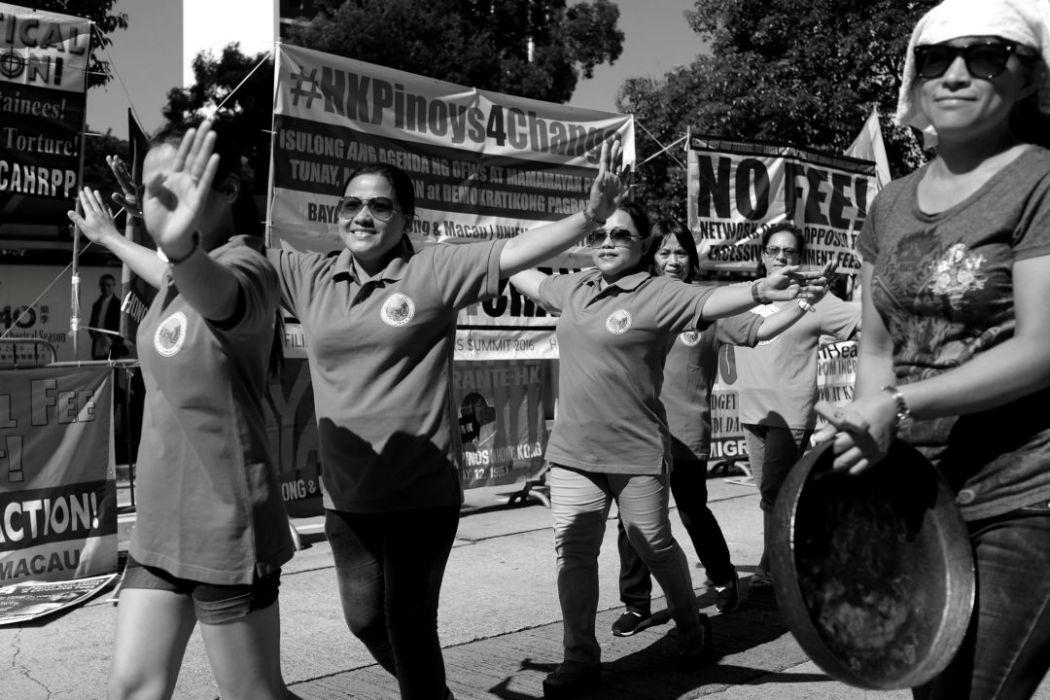By PLUDW-HK and FADWU
Filipino migrant domestic workers are charged illegal fees by unscrupulous employment agencies in both the Philippines and Hong Kong. The practice is widespread and government systems to prevent such illegal activities are not fit for purpose. As a result, many migrant domestic workers have little choice but to pay these exorbitant fees and are heavily indebted, making it difficult to leave exploitative and abusive employers.


Between a Rock and a Hard Place is a new report and short documentary film by the Progressive Labor Union of Domestic Workers – Hong Kong (PLUDWHK) and Hong Kong Federation of Asian Domestic Workers Union (FADWU). It documents the illegal activities of employment agencies in the Philippines and Hong Kong, and the failure of both governments to protect the rights of Filipino migrant domestic workers.
“Our research clearly demonstrates that significant numbers of agencies are systematically charging Filipino migrant domestic workers fees well in excess of the legal maximum. Yet despite this, very few are ever charged and prosecuted in the Philippines or Hong Kong,” said Shiella Estrada, Chair of the PLUDW-HK.

Although Filipino employment agencies are prohibited from charging placement fees, 84% of the Filipino migrant domestic workers interviewed paid an average of PHP52,644 (US$1,135) in fees. In addition, agencies in the Philippines frequently force experienced domestic workers to undergo unnecessary training in order to increase their profits. In Hong Kong, where employment agencies are only allowed to charge 10% of the domestic worker’s first month’s salary or HK$431 (US$56), the average paid by interviewees was HK$11,321 (US$1,459) or the equivalent of more than 25 times the legal limit.
“The charging of illegal fees by Hong Kong agencies leaves Filipino migrant domestic workers with huge debts. This in turn makes it even more difficult for them to challenge exploitative practices that they frequently experience. Although our research focused on Filipino domestic workers, other nationals experience similar, even worse, treatment,” said Phobsuk Gasing, Chair of FADWU.

Despite attempts by the Philippines and Hong Kong governments to protect the rights of migrant domestic workers, both governments have failed to adequately monitor, prosecute and punish employment agencies that act illegally. Between 2014 and 2015, Hong Kong’s Labour Department only secured 10 convictions for overcharging. Agencies convicted of overcharging or unlicensed operation were fined HK$1,500 to HK$45,000 (US$193 to US$5,800). It is not surprising then that a significant number of Hong Kong agencies are blatantly charging illegal fees with little fear of reprisal.
“The government systems to police the agencies in the Philippines and Hong Kong are not fit for purpose. The agencies know that they are unlikely to get caught charging illegal fees. They hide their criminal activities by using loan companies to collect the fees and refusing to issue receipts to the domestic workers. Even for those few who are caught, the fine is insignificant so it does not act as an effective deterrent,” said Shiella Estrada.

It is not uncommon for employment agencies in Hong Kong to send Filipino migrant domestic workers to Macau to wait for their new work visa to be arranged. These agencies exploit this situation by charging, once again, illegal agency fees.
PLU’s covert recordings at 10 employment agencies across Hong Kong show that some agency staff will openly state fees above the legal maximum to migrant domestic workers who enquire about their services. All agencies in the recordings violated Hong Kong’s Employment Ordinance in at least one instance, including charging illegal fees and demanding payment before the workers had received their first month’s salary.
“These illegal practices have been going on for far too long. The Philippine and Hong Kong governments are fully aware but so far have lacked the political will to act. They must now take concerted action to stop these illegal and unethical activities,” said Phobsuk Gasing.
